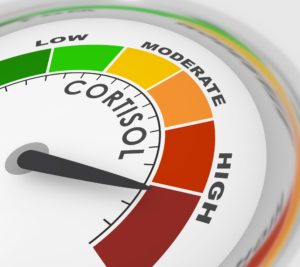
Men don’t have to suffer from male adrenal fatigue. A comprehensive treatment is first diagnosed with hormone testing to assess levels of cortisol at various times of the day, plus other hormone levels that are being affected by imbalanced adrenal gland production.
Men frequently suffer from adrenal fatigue syndrome and the stress that causes it. The adrenal glands are found above the kidneys play an essential role in the human body. They secrete over 50 hormones that are responsible for regulating various functions we need to stay alive, healthy, and thriving.
These hormones for men include cortisol, dehydroepiandrosterone (DHEA), progesterone, testosterone, and epinephrine (adrenaline). The adrenal glands help humans deal with the “fight or flight” response and regulate our reaction to stress.
With our hectic lifestyles, many of us feel tired and over-stressed. When we don’t manage stress well and it becomes overwhelming, our adrenal glands get exhausted and we experience hormonal imbalances. We present with symptoms that seem like a normal part of a hectic life without often realizing that feeling drained is not normal.
When we’re in a constant state of stress and struggle, the adrenal glands continuously over-produce cortisol. When this type of exertion is experienced, the adrenal glands eventually stop producing enough cortisol and it results in adrenal fatigue in men. A condition that affects all aspects of life.
A chain-reaction is triggered affecting other hormones of the male body. Hormones such as DHEA become insufficient and are not able to maintain a healthy hormonal balance contributing to symptoms of male adrenal fatigue. All hormones work in harmony to keep the body in balance, which means they should all be working at optimal levels.
What is Cortisol?
The primary adrenal hormone utilized to manage stress is cortisol, which is why it is also called the “stress hormone” or hydrocortisone. Cortisol is released by the adrenal glands in response to excitement, stress, low blood sugar, and physical exertion. It collaborates with your brain to keep your motivation, fear, and mood in check.
The hypothalamus and pituitary gland, which are both located in the brain, sense if your blood has sufficient levels of cortisol. If levels are low, your brain sends a signal that tells the adrenal glands how much cortisol to release.
When your body reaches an alert state, cortisol receptors contained in almost all the cells of your body receive a message that prompts them to shut down your growth processes as well as your digestive, reproductive, or immune systems.
Cortisol’s functions:
- Controls blood sugar levels.
- Regulates metabolism.
- Acts as an anti-inflammatory.
- Influences memory formation.
- Controls water and salt balance.
- Influences blood pressure.
In a healthy body, cortisol is at its highest amounts within the first waking hours and decreases in production slowly as the day continues. When stress is prolonged, too extreme, or poorly managed, the adrenal glands are not able to continue to work properly and the body manifests various symptoms.
If stress continues at high levels for an extended amount of time, this is known as chronic stress. The body compensates by producing higher levels of cortisol while neglecting to produce other hormones. The condition results in adrenal fatigue and a hormonal imbalance that causes a host of ailments.
Although cortisol levels initially rise consistently, they eventually drop as adrenal fatigue settles in. A cortisol imbalance, like any other hormone imbalance, leads to major health conditions and accelerates aging. Having this condition is sometimes mistaken for the “normal” way of aging, but it is important to know that you don’t have to feel a significant decline as you age.
If you take proper care of your body and condition it, chances are you’ll reach old age gracefully and with lots of function and vitality.
For a free consultation, call (305) 682-1818
Why Men Need to Pay Attention to Cortisol
Stress is a normal part of life. Moderate stress provides a man with the “go and get them” attitude required to conquer everyday challenges, achieve goals, and deal with the obstacles that get in the way.
However, when stress becomes chronic, men suffer from all the health consequences that ensue from a cortisol imbalance. What is especially tough for men, is that we are inclined to put on a brave face and never show our weakness. It is hard for us to admit to ourselves and those around us that we need help and that we are overwhelmed.
Being overworked or burdened by our load impacts our masculinity and frequent roles of being the providers for our families. We are hesitant to show our vulnerability and instead power through it all at the expense of our health. Perhaps that’s why women live longer? Men don’t have to ignore their health, we are evolving into taking better care of our bodies and getting help when we need it. With modern health modalities, there’s lots of hope for men to live a long healthy life.
Symptoms of Imbalanced Cortisol
The symptoms that present from a male cortisol imbalance are similar to what occurs with andropause (the male version of menopause). These symptoms can include:
- Weight gain
- Foggy thinking
- Anxiety
- Fatigue
- Depression
- Irritability
- Decreased bone and muscle density
Some of these symptoms may be associated with normal aging, but their importance should not be discarded without further investigating what is happening inside the body.
Click to contact our specialist today
Medical Conditions Caused by Cortisol Imbalance
A cortisol imbalance can have a detrimental effect on the male body. Common medical conditions occur such as:
- Obesity
- Weak immune response
- High blood pressure
- Hyperglycemia
Cushing’s Syndrome
Cushing’s syndrome is a condition that develops when excessive cortisol is present over a prolonged time frame. It is caused by a variety of factors including a tumor that produces the adrenocorticotropic hormone, which increases the secretion of cortisol. Taking particular types of drugs can also create this condition.
Addison’s Disease
Addison’s disease results from damage to the adrenal glands. The greatest cause of this condition is autoimmunity, which attacks the adrenal cortex. Tuberculosis is a known cause of this disease. Lifestyle changes and hormone replacement therapy helps patients regain their well-being.
Adrenal Fatigue
The most common medical condition from the overproduction of cortisol is adrenal fatigue. It presents with the following symptoms:
- Fatigue in the middle of the day
- Difficulty sleeping
- Emerging allergies
- Chemical sensitivity
- Anxiety
- Weakened immune system
- Decreased tolerance to stress
- Pain in joints
- Lowered sex drive
- Depression
- Food cravings
- Erectile dysfunction
- Loss of muscle mass and strength
As you can see hormonal imbalances affect all aspects of life. It is essential to handle the condition diligently before it worsens. The first step is to determine the hormone levels of the body to determine the proper treatment.
Complete a Free Consultation form now
Diagnosis of a Cortisol Imbalance and Adrenal Fatigue
If you experience any of the symptoms mentioned above, it is wise to immediately receive an assessment of your cortisol levels. Due to levels of cortisol for men fluctuating throughout the day, physicians find an accurate test from urine level testing.
In urine level testing, patients are asked to provide five samples each day. This number of samples allows the results to be accurate because they show the natural fluctuation of cortisol as the day progresses.
How to Treat Cortisol Imbalances in Men
Physicians that offer bioidentical hormone therapy can help men recover from their hormonal imbalance. A customized treatment plan is designed uniquely for each patient. The first step is performing a comprehensive lab test that shows cortisol levels and other hormones.
A recovery plan can be implemented with bioidentical hormone replacement therapy, which is often combined with high-quality supplements, and lifestyle changes. For men to continue having a healthy adrenal function, they must avoid excessive stress and learn how to manage it.
Implementing breathing exercises, meditation, and yoga into their lifestyle is also a great way to keep a healthy hormonal balance. Sleeping eight hours each night, and practicing gratitude are all parts of a healthy body.
Men should consume a diet rich in probiotics such as those found in fermented vegetables. Bananas, dark chocolate, pears, and lots of water are also a great part of a healthy adrenal diet. They should not consume processed foods, high amounts of caffeine, alcohol, or refined sugars.
Combined with hormone replacement therapy, these lifestyle choices will not only bring hormone levels to balance, but also provide all the benefits of overall well-being. An integrated approach to health is an effective way to bring balance back into your life.
What’s Next?
The exciting part is that now you know the possible cause for your symptoms. Now, you’re able to take charge of your wellness by implementing healthy lifestyle routines and connecting with professionals who will guide you through the rebalancing of your hormones.
Visit our anti-aging clinics to start your comprehensive assessment. Our experienced physicians have helped many men regain their health after adrenal fatigue and cortisol imbalances. We provide tailored treatment plans as every individual is unique.
Our expert team is happy to answer all of your questions and provide you with excellent care at every phase of your treatment because, at HealthGAINS, we know that treatment is only the beginning of the healing process and not the end.
Call us at 305-682-1818 today.
References
- https://www.webmd.com/a-to-z-guides/adrenal-fatigue-is-it-real#1
- https://www.healthline.com/health/cortisol-urine#TOC_TITLE_HDR_1
- https://www.healthline.com/health/bioidentical-hormone-replacement-therapy
- https://www.hopkinsmedicine.org/health/conditions-and-diseases/adrenal-glands
- https://www.health.harvard.edu/newsletter_article/dhea-and-health-more-questions-than-answers
- https://www.ncbi.nlm.nih.gov/pmc/articles/PMC4046605/
- https://www.yourhormones.info/endocrine-conditions/cushings-syndrome/
- https://www.yourhormones.info/endocrine-conditions/addisons-disease/
Call or text (305) 682-1818 or complete a Free Consultation Form






